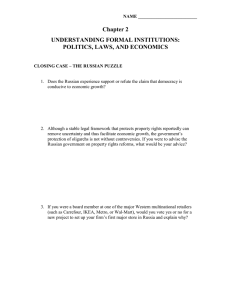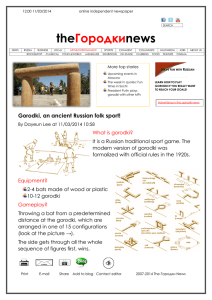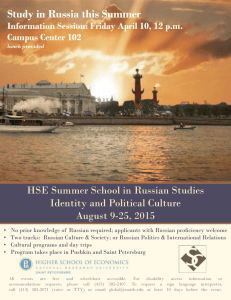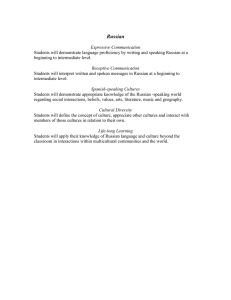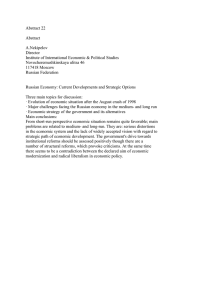Russian 301 Advanced Grammar and Composition Department of European Studies
advertisement
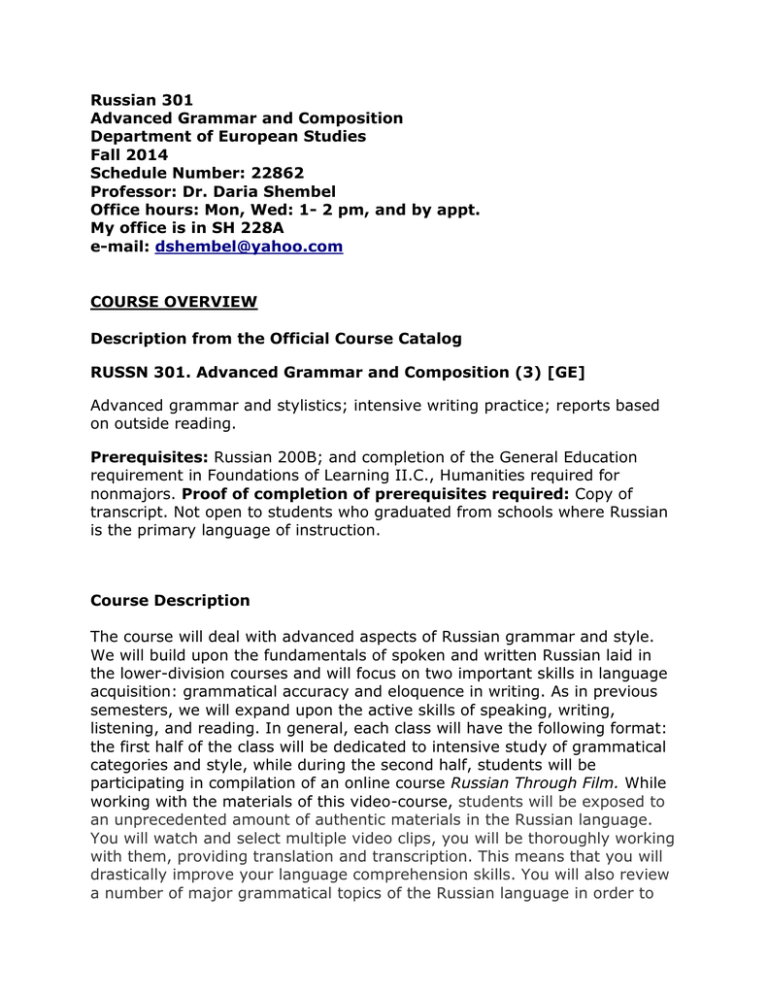
Russian 301 Advanced Grammar and Composition Department of European Studies Fall 2014 Schedule Number: 22862 Professor: Dr. Daria Shembel Office hours: Mon, Wed: 1- 2 pm, and by appt. My office is in SH 228A e-mail: dshembel@yahoo.com COURSE OVERVIEW Description from the Official Course Catalog RUSSN 301. Advanced Grammar and Composition (3) [GE] Advanced grammar and stylistics; intensive writing practice; reports based on outside reading. Prerequisites: Russian 200B; and completion of the General Education requirement in Foundations of Learning II.C., Humanities required for nonmajors. Proof of completion of prerequisites required: Copy of transcript. Not open to students who graduated from schools where Russian is the primary language of instruction. Course Description The course will deal with advanced aspects of Russian grammar and style. We will build upon the fundamentals of spoken and written Russian laid in the lower-division courses and will focus on two important skills in language acquisition: grammatical accuracy and eloquence in writing. As in previous semesters, we will expand upon the active skills of speaking, writing, listening, and reading. In general, each class will have the following format: the first half of the class will be dedicated to intensive study of grammatical categories and style, while during the second half, students will be participating in compilation of an online course Russian Through Film. While working with the materials of this video-course, students will be exposed to an unprecedented amount of authentic materials in the Russian language. You will watch and select multiple video clips, you will be thoroughly working with them, providing translation and transcription. This means that you will drastically improve your language comprehension skills. You will also review a number of major grammatical topics of the Russian language in order to create Power Point Presentations for the course. It will not only be an exciting linguistic journey for you in terms of language comprehension and production, but also a creative new media experience since you will be responsible for the course design. How will students contribute to the course development: All our classes will be held in LARC labs. Students will be working individually and sometimes in small groups and will be developing and designing all sorts of course materials. Typically, they will be responsible for finding clips on the given theme, translating and transcribing them (providing subtitles), describing the video in both languages, and then working on the development of various assignments for that particular video segment. Assignments usually include vocabulary activities, comprehension activities, multiple choice questions, audio and writing activities, grammar power point presentations and questions. Assignments and video segments are going to be of varying difficulty to accommodate speakers of different levels. Students Learning Objectives: 1) Demonstrate familiarity with the general structure of the Russian language, in particular understanding the role of gender, number, case, aspect, and conjugation. 2) Students will widen their knowledge of Russian grammar which will enable them to expand stylistically their oral and written discourse. 3) They will have developed analytical tools to make linguistic generalizations about the structure of the Russian language and invoke them to enhance their previous knowledge of Russian grammar. 4) Demonstrate intermediate high/ advanced writing processes including generating ideas, organizing material, and grammatical proofreading of the text. 5) Students will be able to work with authentic videos and texts in Russian, summarize and analyze them. Required readings: Luggage: Basic Russian Grammar with Exercises; Mustajoki, A., Alestalo, M., Viimaranta, H; Zlatoust 2008 (ISBN 978-5-86547-323-7) All other materials will be distributed in handouts. COURSE FORMAT AND REQUIREMENTS Blackboard Consult the Blackboard website for this course before every class. You are responsible for accessing materials available there. Attendance Class attendance is mandatory. Written excuses include medical reasons and religious holidays. More than two unexcused absences will result in a lowering of your final grade. Course requirements: - Class attendance and participation 10% - Submission of grammar assignments 15% - Multimedia course-compilation related assignments 25% - Midterm exam 15% - Final take-home exam 15% - Final projects (tba) 20% Grades as defined at SDSU as: A: Outstanding achievement, available for the highest accomplishment. B: Praiseworthy performance, definitely above average. C: Average awarded for satisfactory performance; the most common undergraduate grade. D: Minimally passing, less than typical undergraduate achievement F: Failing C/NC: Some students may, subject to their major requirement and the conditions set out in the General Catalog, choose to take the course credit/no credit. Work equivalent to C or above will result in a grade of Credit; work equivalent to C- or below will result in NO Credit. WU: Indicates that an enrolled student did not withdraw from the course but did not fulfill the course requirements. For purposes of grade point average computation, this grade is equivalent to an F. Students who are failing when they stop attending class will receive an F, not a U. Academic Integrity College of Arts and Letters expects the highest standards of academic excellence and ethical performance from students. It is particularly important that you are aware of and avoid plagiarism, submitting a paper to more than one instructor, or submitting a paper authored by anyone other than yourself. All incidents of cheating or plagiarism will be reported to the Judicial Procedures Office as required by CSU Policy. Please visit the link http://infotutor.sdsu.edu/plagiarism/word.cfm?p=graphic Tutorial Services page on plagiarism. Special section for heritage speakers Since Russian 301 is not specifically designed for heritage speakers, the program for such students will be organized around students’ individual needs and abilities. This program will be intended to address the specific needs of students who speak Russian at home and who did not receive a native Russian’s full educational and cultural background. The individualized program will aim at building a sophisticated vocabulary, developing advanced reading ability and writing competency. Students should be aware of the specific requirements and grading policy that differ from the general requirements for Russian 301. Quizzes and examinations for heritage speakers will be prepared individually. Each student’s commitment and progress level in the class will determine her grade, not the level of previous knowledge in Russian. Please see the instructor during special office hours ASAP to define your individual proficiency and choose a suitable program. Please note - All students are welcome to discuss readings, course content, exams, and other academic topics with the instructor. - If you are having trouble with an assignment or with a concept, please let me know, either during class or office hours. Questions are always welcome! Course Schedule Week 1 Introduction to course and to one another. Week 1-3 Gender. Declension. Case Usage. Week 4 The Pronoun. Week 5 The Adjective. The Comparative and Superlative Degrees of the Adjective. Week 6 Verbal Aspect. Week 7-8 Verbs of Motion. Week 9 Reflexive verbs, Passive voice. Week 10-11 Nov 2 Participles. Adverbial Participles. Week 12 Adverbs. Week 13 Conjunctions. Week 14 Complex sentences. Week 15 Review for the final. Links and sites: Linguistic blogs: Russian Word of the Day http://shininghappypeople.net/rwotd/ Social networking: http://www.odnoklassniki.ru/ http://vkontakte.ru/ Photo-sharing portals: http://www.fotocontakt.ru/home.php http://club.foto.ru/ News www.newsru.com www.echo.msk.ru
